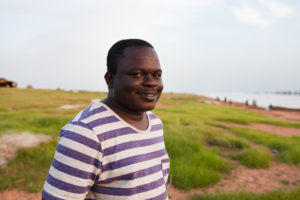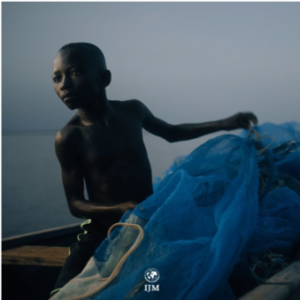IJM Justice Series (Part Four)
This blog is part of a special series released jointly between Baptist21 and International Justice Mission (IJM). Today’s post is written by Leo Ackon, part of the field office staff in Ghana. In Ghana, children as young as three are enslaved in the fishing industry, forced to do hard and dangerous work to earn a profit for their masters. Ghana’s Lake Volta is the world’s largest manmade lake, covering 3,275 square miles, with thousands of children working in its massive fishing industry.
 Ghana is a Christian nation with over 70 percent of the population identifying as Christians. There are churches located on almost every street corner, especially in urban areas.
Ghana is a Christian nation with over 70 percent of the population identifying as Christians. There are churches located on almost every street corner, especially in urban areas.
As a people, we believe so much in gathering to worship through music, teaching of the Word, engaging in evangelism and prayer. This, most people believe, is the ultimate responsibility of a Christian and leads to personal success, prosperity and power. This is what the majority of our church leaders portray to us as both the trademark of righteousness and the path to success.
This formed the basis of my Christian faith growing up. I wanted to be that Christian who is passionate about prayer, the Word, soul winning, serving in the church, living morally upright, paying tithes and giving offerings. I wanted to be all that while yearning for personal prosperity, financial “breakthrough” and fulfilment. I really felt Christianity was all about concentrating on those attributes and pursuing my personal comfort and fame.
As a young Christian, I learned to view ministry to the poor, oppressed, and vulnerable as something optional, that we could do as and when necessary. I saw the fight for justice as the main responsibility of the government and a Christian should not really be very concerned about it. Even as a pastor, like many other pastors in Ghana, I thought justice was not our core responsibility, but that of government.
Then God began to challenge me to expand my thinking.
In May 2016, I had the opportunity to join International Justice Mission (IJM) as the Church and Community Relations Manager. IJM is a Christian organization working in Ghana to end the practice of child-trafficking, a form of modern-day slavery. IJM helped me to have a better understanding of the justice thread in the Bible, and how passionate God is about the poor and oppressed. Coming face to face with the harsh realities of the conditions endured by boys on the lake, coupled with my own father’s experience of someone more powerful than him swindling him out of severance pay, I was transformed and inspired to passionately pursue justice and lead other church leaders into this work for God.
 My team and I educate and equip church leaders in Ghana to understand and become passionate about justice, and to help end child slavery on Lake Volta. When I engage pastors on the theme of justice in the Bible, Matthew 23:23 is one of my favourites:
My team and I educate and equip church leaders in Ghana to understand and become passionate about justice, and to help end child slavery on Lake Volta. When I engage pastors on the theme of justice in the Bible, Matthew 23:23 is one of my favourites:
“Woe to you, teachers of the law and Pharisees, you hypocrites! You give a tenth of your spices—mint, dill and cumin. But you have neglected the more important matters of the law—justice, mercy and faithfulness. You should have practiced the latter, without neglecting the former.”
At a recent conference hosted by IJM for Ghanaian pastors, our keynote speaker issued a challenging statement. Rt. Rev. Dr. Hilliard Dogbe of the A.M.E. Zion Church challenged church leaders to pursue justice in their churches and communities, even if it costs them members. He asked them “…do you want to be a faithful pastor or a popular pastor?”
Preacher Rusgyeson Amengor, age 78, was one of the 270 church leaders that heard that challenge. As a result, he went back into his village, on the shore of Lake Volta and preached the message he heard, making a courageous stand against child trafficking. He then chose to host a Freedom Sunday– one Sunday a year that is set aside to focus on Biblical justice and praying for an end to slavery in the world. He also organised a village gathering to reach beyond his congregation and educate his whole community, which used to be known for child trafficking, and rallied their support in promoting education of the issue. It was inspiring to see his courage in action.
Rusgyeson’s continuous advocacy on the issue led to the formation of a committee of volunteers in the community that approached boat masters to stop slavery. The committee also supports local schools to encourage pupils’ interest in education. I marvel at the continuing impact of one pastor’s courageous obedience to the call of God. And this is but one story of many pastors who are becoming passionate about justice.
We were thrilled last year when so many churches in Ghana hosted Freedom Sunday. We hope for even more this year, which will help raise the profile of God’s heart for justice in congregations and communities all over my country.
Today, I invite you to make a difference in the lives of child slaves in Ghana and across the world by hosting your own Freedom Sunday – and partnering with IJM in this fight.
Together, we can change lives; make the world a better place; and bring to bear God’s Kingdom on earth. And I ask you, “…do you want to be a faithful pastor or a popular pastor?”

